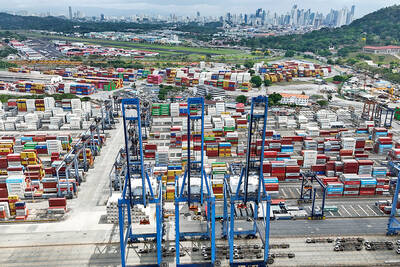The Colombian government said a proposed US trade deal will grow its economy by 1 percent and it hopes the pact can create new markets, while critics said the deal could lead to bigger cocaine crops.
Colombian President Alvaro Uribe thanked US President George W. Bush on Monday for sending the trade pact to Congress and said he hoped for “a grand bipartisan agreement” to approve the deal.
“I want this message to get to the US Congress: I beg you to look at the current problems [in Colombia] and the favorable evolution that Colombia has experienced,” Uribe told reporters.
Since taking office in 2002, Uribe has demobilized many of the paramilitaries under an amnesty program and gone on the offensive against leftist rebels, sharply lowering levels of kidnapping and murder.
But the nation’s trade unions and other critics see the opposite scenario if the US Congress approves the deal — the loss of millions of jobs and an economic downturn that could drive even more farmers into the cocaine trade.
The number of labor activists who have been killed has declined since 2002, but the unions say Uribe’s administration has encouraged assassinations of trade unionists who cause problems for companies.
“It tries to stigmatize us, it tries to paint us as rebels and that’s when the right-wing death squads try to kill us,” said Fabio Arias, vice president of Colombia’s largest trade union federation.
“These death squads still work with parts of the military and police to kill trade union members in Colombia,” he said.
Arias estimates 3.5 million Colombians would be put out of work — especially producers of poultry, corn, clothing and furniture — as tariff-free US imports flood the market and companies use the language of the accord to more easily fire workers.
Colombia’s Treasury Minister Oscar Ivan Zuluaga predicts an entirely different scenario — economic growth of more than 1 percent thanks to locked-in terms for exports of Colombian clothing, flowers, textiles and other products, which already get preferential US treatment under the Andean Trade Preference Act, which is a temporary measure.
Permanently eliminating tariffs on Colombian goods would also create more viable alternatives for farmers who often resort to growing coca — the main ingredient of cocaine — because they lack markets for legal products, the Colombian government says.
But Adam Isacson, a Colombia expert with the Center for International Policy in Washington, warned that the pact may have a reverse effect because it could jeopardize farmers in Colombia who grow legitimate crops, forcing some of them to grow coca.
Bush said failure to approve the deal would encourage Venezuelan President Hugo Chavez’s anti-US regime and cast the US as untrustworthy in a region where Uribe is the Bush administration’s strongest ally.

THE TRAGEDY OF PUNCH: Footage of the seven-month-old Japanese macaque has gone viral online after he was rejected by his mother and formed a bond with a soft toy A baby monkey in Japan has captured hearts around the world after videos of him being bullied by other monkeys and rejected by his mother went viral last week. Punch, a Japanese macaque, was born in July last year at Ichikawa City Zoo. He has drawn international attention after zookeepers gave him a stuffed orangutan toy after he was abandoned by his mother. Without maternal guidance to help him integrate, Punch has turned to the toy for comfort. He has been filmed multiple times being dragged and chased by older Japanese macaques inside the enclosure. Early clips showed him wandering alone with

Australian Prime Minister Anthony Albanese yesterday said he did not take his security for granted, after he was evacuated from his residence for several hours following a bomb threat sent to a Chinese dance group. Albanese was evacuated from his Canberra residence late on Tuesday following the threat, and returned a few hours later after nothing suspicious was found. The bomb scare was among several e-mails threatening Albanese sent to a representative of Shen Yun, a classical Chinese dance troupe banned in China that is due to perform in Australia this month, a spokesperson for the group said in a statement. The e-mail

‘OCCUPATION’: Hong Kong said it had lodged ‘stern protests’ with Panama’s consulate, and would ‘staunchly support’ the rights and interests of Hong Kong companies Panamanian President Jose Raul Mulino on Monday ordered the temporary occupation of two ports run by a unit of CK Hutchison Holdings Ltd following the Supreme Court’s ruling against the firm’s concession, escalating a dispute that has become a proxy battle between the US and China in Latin America. Mulino said in a speech that the administration and operation of the two ports on the strategic Panama Canal is to revert to the country’s National Maritime Authority to ensure their uninterrupted, safe and efficient operation. The occupation covers movable equipment at the ports and does not mean a definitive loss of

GAME CHANGER The Russian invasion of Ukraine has shown the utility of small drones for recon, for supporting logistics and for killing across the modern battlefield Five European nations have announced a new program to produce low-cost air defense systems and autonomous drones using Ukrainian expertise, hard-won over the past four years fighting against Russia. Friday’s initiative of the five nations — France, Poland, Germany, the UK and Italy — comes as one of many European efforts to bolster defense along their borders, like a “drone wall ” with Russia and Ukraine to better detect, track and intercept drones violating Europe’s airspace. Both Moscow and Kyiv have cutting-edge drone warfare capabilities forged in the grim laboratory of war where battlefield innovations have rewritten modern battle tactics. Poland is